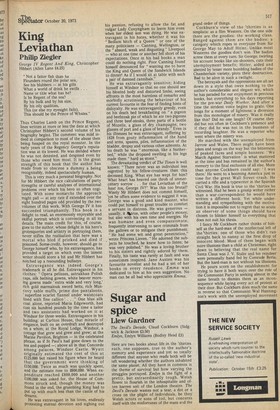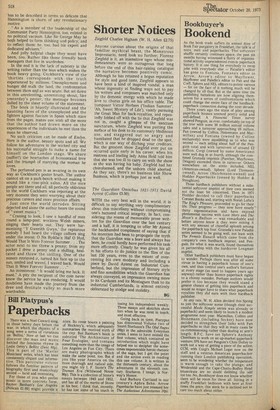Sugar and spice
Llew Gardner
The Devil's Decade, Claud Cockburn (Sidgwick & Jackson £3.50) Emlyn, Emlyn Williams (Bodley Head £3) Here are two books about life in the 'thirties each, one supposes, true to the author's memory and experience and yet so totally different that anyone who reads both will be left wondering whether the authors inhabited the same planet. All they have in common is the theme of survival but how varying the struggles portrayed. Emlyn is the fight of a pretty, but extraordinarily tough, Welsh flower to flourish in the inhospitable and often barren soil of the London theatre. The .Devil's Decade wastes not a tear, a dot or a cross on the plight of individuals, be they Welsh actors or sons of toil, but concerns itself with the misfortunes of the mass aid the
grand order of things. Cockburn's view of the 'thirties is as simplistic as a film Western. On the one side there are the goodies: the working class.
Ranged against them are the badies: a category which ropes in everyone from Sir George May to Adolf Hitler. Unlike most Westerns the goodies don't win. The badies screw them at every turn. Sir George, twirling his account books like six-shooters, cuts their unemployment benefit; Hitler, aided and abetted by lesser more bumbling badies of the Chamberlain variety, plots their destruction. Bad to be alive in such a twilight.
The betrayals and the oppressions are all set down in a style that owes nothing to the author's considerable and elegant wit, which he has paraded for our enjoyment in previous books, but everything to his days reporting
for the pre-war Daily Worker. And after a
time the strident voice begins to grate. One longs for a moment of lightness; a diversion from this monologue of misery. Was it really like this? Did no one laugh? Of course they did but not often in Cockburn's presence and if they did he was not in the business of recording laughter. He was a reporter who went where the misery was.
He marched with the unemployed from Jarrow and Wales. There might have been jokes and songs on the way but the bitterness of peaked faces and simple banners: ' We March Against Starvation' is what mattered at the time and has remained in the author's memory to the final exclusion of all else. More than anyone Cockburn could say: 'I was there.' He went to a booming America just in time for the great Wall Street crash. He carried a rifle and a typewriter in the Spanish Civil War. His book is true to the 'thirties he witnessed. Had he been a gossip writer rather than a war-correspondent he would have written a different book. Yet while understanding and sympathising with the motiva tion it is impossible not to regret that so acute an observer of some things should have chosen to blinker himself to everything that does not suit his thesis.
I fancy Mr Cockburn rather thinks of himself as the hard-man of the intellectual left of the 'thirties: one of those who didn't run straight back to nanny at the first drop of innocent blood. Most of them began with more illusions than a child at Christmas, right down to believing that the real name for Santa Claus was J. V. Stalin and his reindeer were personally hand fed by Comrade Beria. But the hard-man is not without his illusions. He pours scorn on the establishment for trying to have it both ways over the role of the Communist Party in seeking almost in the same breath to dismiss them as an inconsequence while laying every act of protest at their door. But Cockburn does much the same in reverse so that Communist Wal Hannington's work with the unemployed movement has to be described in terms so delicate that Hannington is shorn of any revolutionary motive: "As a member of the leadership of the Communist Party Hannington, too, existed in no political vacuum. Like Sir George May he both helped to form thinking and policy, and to reflect them: he, too, had his expert and dedicated advisers."
And jolly helpful chaps they must have been, too. Rather like those friendly bank managers that live in wardrobes.
In the end it is the lack of subtlety in the writing rather than the bias which makes the book heavy going. Cockburn's view of the 'thirties corresponds with the truth experienced by millions. Unemployment and hunger did stalk the land, the confrontation between them an,c1 us was acute. But set down in this unrelenting, unremitting shout, like yesterday's poster, the message becomes dulled by the sheer volume of the statement. The book is heavily illustrated and the haunting faces of the unemployed and the fighters against fascism in Spain which stare from the pages, makes one wish all the more that the author had drawn more on the experiences of the individuals he met than the mass he observed.
No such criticism can be made of Emlyn. Here is the author, beauty spots and all. We follow his adventures in the wicked city and his successful struggle to make a name for himself on the London stage. We share (suffer?) the heartaches of homosexual love and the triumph of marrying the woman he loves.
The perfumed pen is as wearing in its own way as Cockburn's poster brush. The author cannot sit on a park-bench without making it sound like a rose-pink salon All the nice people are there and all, all perfectly oblivious to the world Cockburn was reporting at the very moment they were worrying about their precious careers and more precious affairs. Just once the world intrudes. Sitting dejected and alone the author hears the sound of " sweet musics": "Craning to look, I saw a handful of men round a lamp-post: workless Welsh miners, singing their hearts out. They were harmonising 'Y Gwenith Gwyn, the rapturous melody I had heard the village colliers sing under the moon: 0 Na Byddain Haf 0 Hyd, Would That It Were Forever Summer . . . The actor next to me threw a penny; from my pocket I drew a penny and a shilling, hesitated and threw the shilling. One of the miners retrieved it, turned his face up to the sun, smiled and waved, I waved back. Would That It Were Forever Summer . . ."
An investment: "It would bring me luck. It must." A pity the recipient of the coin never knew the service he was rendering. It would doubtless have made the journey from the dree and destitute valley so much more worthwhile.



































































 Previous page
Previous page